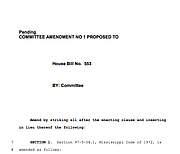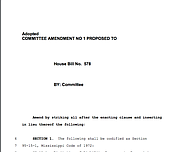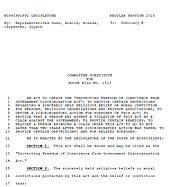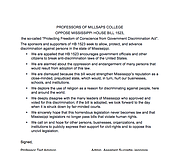Sandy Middleton, the executive director of the Center for Violence Prevention, spoke to the Senate Judiciary A Committee about the necessity of a human trafficking policy bill. Photo courtesy Sandy Middleton
Mississippi has a human-trafficking problem that gets far too little law-enforcement and medical attention, but a bill is still alive in the Mississippi Legislature that would provide more resources to fight the problem. Sandy Middleton, executive director of the Center for Violence Prevention in Pearl, said House Bill 553 would create what she called a three-pronged approach to crack down on the state's human trafficking problem. House Bill 553 made it out of the Senate Judiciary A Committee last week but still needs to pass the full Senate this week and receive the necessary funding.
The bill provides for more law-enforcement officers dedicated to human trafficking, training for medical professionals, and hospitals to help identify and respond to human-trafficking cases when they treat patients and create an emergency shelter for trafficked victims in the Jackson metropolitan area.
Sen. Sean Tindell, R-Gulfport, allowed Middleton to speak with the committee last week about the bill because her center is the coordinating organization for the emergency shelter that helped draft the original bill.
"There's a lot of frustration with the lack of training and the lack of manpower, so this bill would allow additional law-enforcement officers," Middleton said.
The bill would add six officers—three from the Mississippi Bureau of Narcotics and three from the Mississippi Bureau of Investigation—to human-trafficking investigation teams, Middleton told the committee. There would be two officers each stationed in Oxford, Jackson and on the coast with the emergency shelter located in the Jackson metro.
Senators on the committee had questions for Middleton about the necessity of such a shelter as well as funding.
"We don't have a place to take these victims, there are victims that are still on the street—this is a huge problem," she told the committee.
Middleton said if existing domestic-violence and assault shelters were used, they would end up displacing those victims because human-trafficking victims need shelter for a likely longer time span than domestic violence victims.
Tindell assured the committee that the bill is subject to funds available through the Mississippi Department of Mental Health. The total cost of the bill is $2.45 million, which would come from the department's appropriation. Middleton said her center and the department submitted performance-based objectives to the PEER committee in order to receive the funding if its available.
'Anti-Terror,' 'Anti-Discrimination' Bills Stay Alive
The Mississippi See Something, Say Something Act, which was introduced in the House in response to the December terrorist attacks in San Bernardino, Calif., passed the Senate on Monday but was held on a motion to reconsider. The Senate Judiciary A Committee passed its version of the bill, which provides civil and criminal liability to a person who makes a report to law enforcement officials with "objectively reasonable suspicion." The report must be made with the belief that "the behavior or activity constitutes or is in furtherance of an act of terrorism."
Tindell told his committee this act would protect the neighbor of the terrorists in San Bernardino who was reportedly too afraid to report suspicious activity because she thought she would be held liable or sued.
Not all senators in the committee were on board. Sen. Chris McMahan, R-Guntown, expressed concerns about needing the bill.
"Is there a case in Mississippi where we need such a law?" he asked Tindell.
"I don't know that there's been a case in Mississippi, but I do know that that incident (in California) and the revelation that she didn't want to report anything because she was afraid that action would be taken against her is what brought forward the request for this bill," Tindell said.
McMahan was not appeased. "This type of law could be abused," he said.
The bill made it out of committee, but not all members voted in its favor.
The "Protecting Freedom of Conscience from Government Discrimination Act" would allow state employees to legally use an excuse like Kim Davis did last year. The Kentucky county clerk was jailed for failing to issue same-sex marriage licenses, using religious reasons. The bill passed out of Tindell's committee before the deadline for bills to get out of committee passed. His committee added no new language to the bill, which Democrats contested in the House.
The Human Rights Campaign and the ACLU of Mississippi call the bill a discriminatory piece of legislation.
Rob Hill, executive director of the Human Rights Campaign in Mississippi, said House Bill 1523 has nothing to do with the First Amendment and people's right to exercise their religion. "People have the constitutional right to freely exercise their religion, but that does not and never has been an excuse to discriminate on the taxpayer's dime," Hill said at the Capitol last week.
Hill said neither circuit clerks or judges could deny same-sex couples marriage licenses or refuse to solemnize their marriages after the U.S. Supreme Court decided last year that same-sex marriage is a right of American citizens.
Erik Fleming, a former legislator and director of policy and advocacy at the ACLU of Mississippi, said that religious freedom does not give anyone the right to harm others. "House Bill 1523 does not advance religious liberty but instead allows people to discriminate against LGBT people and hide behind religion to do so," Fleming said.
The bill is also bad for business and tourism in the state, Fleming said. Other state legislatures in Georgia and North Carolina have introduced similar bills this year, and large corporations have expressed their distaste in return. Film giants Disney and Marvel have said they will boycott Georgia if the "Free Exercise Protection Act" in the Georgia Legislature becomes law, perhaps contributing to that governor's decision to veto it. Georgia's bill is similar to Mississippi's, giving religious organizations, officials, and businesses the opportunity to exercise their freedom of religion by not recognizing certain marriages or not hiring certain individuals based on their that organization or person's religious freedom.
Mississippi's bill also exempts state workers from performing their duties based on a religious-freedom claim.
About 75 percent of the Millsaps College faculty have come out against the legislation in a letter published this week, and college students staged a silent protest to the bill on Monday, March 28, at the Capitol.
For more legislative coverage jfp.ms/state. Follow state government reporter Arielle Dreher on twitter at twitter.com/arielle_amara and email her at [email protected].







Comments
Use the comment form below to begin a discussion about this content.
comments powered by Disqus